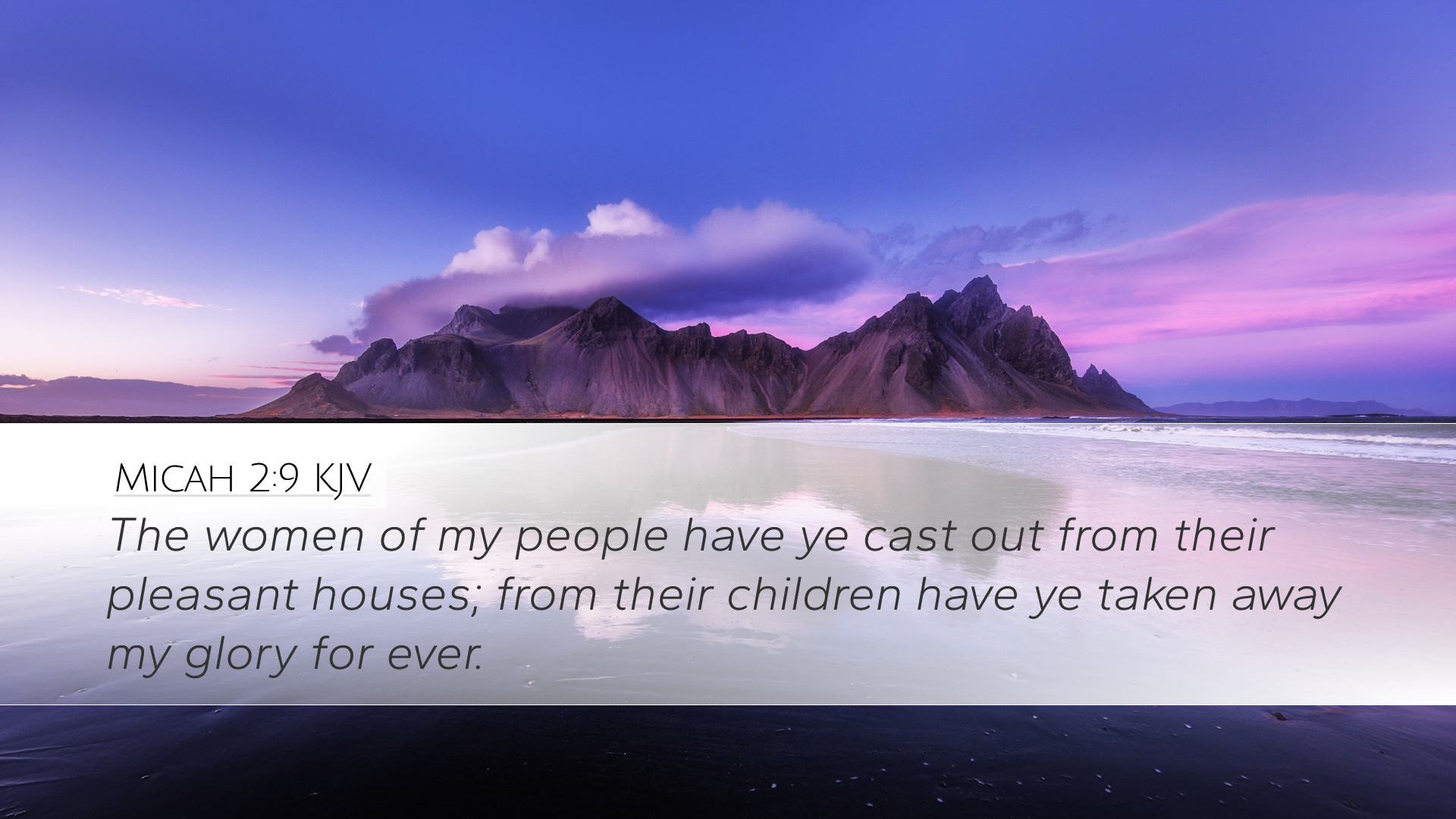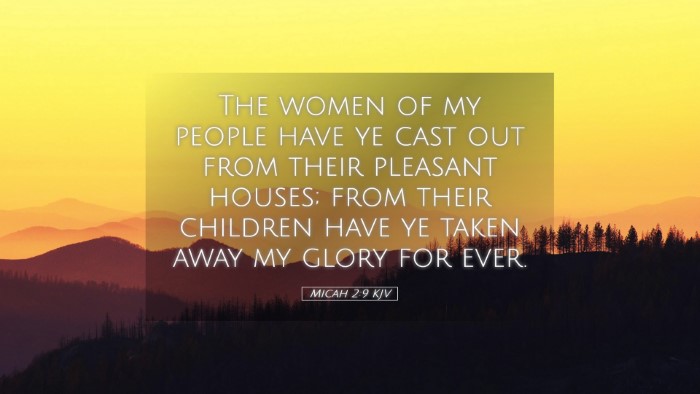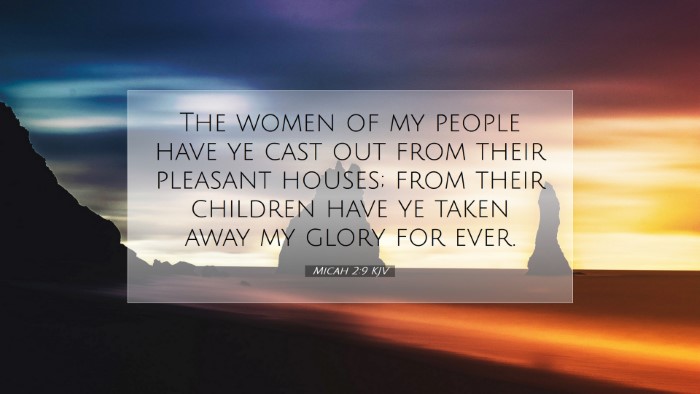Old Testament
Genesis Exodus Leviticus Numbers Deuteronomy Joshua Judges Ruth 1 Samuel 2 Samuel 1 Kings 2 Kings 1 Chronicles 2 Chronicles Ezra Nehemiah Esther Job Psalms Proverbs Ecclesiastes Song of Solomon Isaiah Jeremiah Lamentations Ezekiel Daniel Hosea Joel Amos Obadiah Jonah Micah Nahum Habakkuk Zephaniah Haggai Zechariah MalachiMicah 2:9
Micah 2:9 KJV
The women of my people have ye cast out from their pleasant houses; from their children have ye taken away my glory for ever.
Micah 2:9 Bible Commentary
Commentary on Micah 2:9
Verse: "The women of my people have ye cast out from their pleasant homes; from their children have ye taken away my glory forever." (Micah 2:9)
Contextual Analysis
The prophecy of Micah is set against the backdrop of societal injustice in ancient Israel. Micah, a contemporary of Isaiah, prophesied during a time when widespread corruption, greed, and moral decay were rampant among the leaders of Israel. Here, Micah addresses the exploitation faced by vulnerable groups, particularly women and children, revealing the depths of depravity present in society.
Insights from Public Domain Commentaries
Matthew Henry's Commentary
Matthew Henry constructs a vivid picture of the anguish inflicted upon the women of the people. He notes that the text speaks of oppression: "The sin of those who had the power to protect yet chose to oppress the most defenseless." The women were driven from their homes, places of safety and comfort, showing the brutality of those in power who prioritized their own gain over justice.
In Henry's view, the eviction represented not only a physical displacement but also a spiritual affront, as these women were deprived of their roles and duties within the family structure, contributing to the erosion of family integrity and communal harmony. The loss of children, or "taking away my glory," suggests that the children—a symbol of hope and future—were also affected by the unjust actions of the oppressors, leading to a cycle of despair and disillusionment in both the present and the future.
Albert Barnes' Commentary
Albert Barnes emphasizes the sociopolitical implications of Micah's proclamation. He draws attention to the systemic injustices that characterize society’s neglect of the impoverished and defenseless. Barnes states, "The ruling class had exercised their power oppressively, caring little for the devastating effects of their actions on the families they displaced." He examines the language used in the verse, pointing out that the term "cast out" indicates a deliberate and harsh action, portraying an aggressive expelling rather than a simple removal of women from their homes.
He elucidates further that the “glory” referred to in the verse likely signifies both social status and divine favor, indicating that these women and their children were not merely victims of social injustice but also spiritually marginalized by the oppressive systems in place. This loss of dignity and recognition reflects a broader theological crisis where God's intended order for human relationships and family structure had been severely disrupted.
Adam Clarke's Commentary
Adam Clarke offers another layer of interpretation, focusing on the moral decay surrounding the conditions described. He asserts that such brutal actions against the women and children were not merely political but indicative of a moral failing within the hearts of the people. Clarke insists, "This prophecy acts as a moral indictment against the hearts of those who profess righteousness while perpetuating injustice."
Clarke further interprets “the pleasant homes” as indicative of God’s intended peace and stability in family life, which was being disrupted by a greedy desire for land and wealth. He notes the inherent dignity of women and children in the family unit, accentuating that their suffering is both a social and spiritual affront. Clarke calls attention to the profound suffering inflicted on innocent lives who become collateral damage in the pursuit of wealth by the powerful.
Theological Reflections
Micah 2:9 presents a striking indictment of systemic oppression, calling us to reflect on how we engage with marginalized groups within our own societies. This text is particularly meaningful for pastors, students, theologians, and Bible scholars for the following reasons:
- Understanding Divine Justice: The verse illustrates how God views injustice and oppression. Understanding this helps leaders in faith communities grasp their responsibility to advocate for justice.
- The Role of Vulnerable Groups: The attention paid to women and children highlights the importance of including the vulnerable in our ministries and discussions about social justice.
- Challenge for Ethical Living: The harsh realities of oppression call for an ethical reflection on our values, practices, and the societal structures we support or challenge.
- Call to Action: It encourages action against injustice, challenging us to speak up for those who cannot defend themselves and to work towards restoring dignity to the marginalized.
Conclusion
Micah 2:9 serves as a powerful reminder of the consequences of oppression, the importance of justice, and the profound effects of sin on individual lives and society. The collective insights from Matthew Henry, Albert Barnes, and Adam Clarke provide a well-rounded understanding that can inspire contemporary applications of these biblical principles. The verse thus not only speaks to the historical context of Micah's time but also resonates in today’s world, urging both the church and wider society towards acts of justice and compassion.


